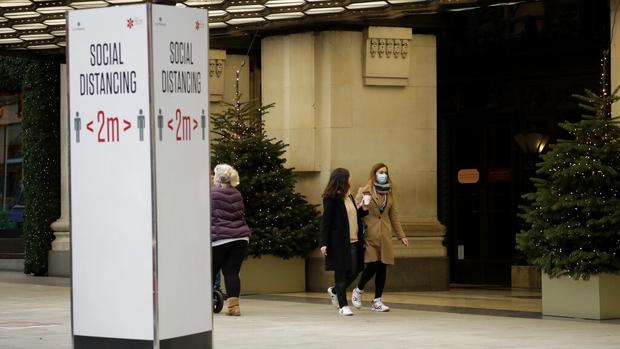 People walk past Christmas trees and a social distancing sign outside the Selfridges department store on Oxford Street, in London, on Nov 23, 2020. (MATT DUNHAM / AP)
People walk past Christmas trees and a social distancing sign outside the Selfridges department store on Oxford Street, in London, on Nov 23, 2020. (MATT DUNHAM / AP)
Many people announced good intentions such as learning a musical instrument when the pandemic first impacted their lives. But one pledge that seems to have been followed through is learning a new language, with the United Kingdom leading the way.
Apps such as Duolingo and Babbel have all reported surges in use, particularly in the UK.
"There's been a huge increase in people wanting to learn for a whole variety of reasons, whether that is for (helping with) school, brain training or culture. We have all wanted to do something positive with our time," Duolingo's UK manager, Colin Watkins, was quoted by the BBC as saying.
The US-based company saw user numbers go up by 67 percent last year. In the UK, usage rose 132 percent, with 13 million Britons now signed up. Spanish is the most popular choice.
ALSO READ: Language crucial for exchanges
"We saw significant increases in new learners right as each country announced its lockdown," said Cindy Blanco, Duolingo's senior learning scientist, told PIE News, an international education website.
"China experienced the first wave of new learners when they locked down," Blanco said. "And waves of new learners joined Duolingo each week as soon as a country implemented lockdown orders."
When a lot of Brits say that they are not very good at language learning, that's the first thing that we don't see in our data.
Arne Schepker, chief executive of Germany company Babbel
Arne Schepker, chief executive of Germany company Babbel, said UK use of his company's app rose by 80 percent last year, revealing popular perceptions about the British and languages to be myths.
Surge in use
"When a lot of Brits say that they are not very good at language learning, that's the first thing that we don't see in our data," he told BBC.
Vicky Gough of the British Council said that there were many reasons behind the surge in learning, and also the languages chosen.
"Working from home and freedom from commuting might have given people more time to begin or return to language learning," she said.
The increase also gives an insight into how people value the importance of language skills.
"The survey found that one-third of UK adults think Spanish is the most important language for young people to learn. That was followed by French at 20 percent and Mandarin Chinese at 18 percent," she said.
"This is a similar finding to our research which places (them) as the three most important languages to maintain and improve the UK's economic position and deepen international influence."
The post-Brexit era may also be a factor in the renewed interest.
"It is possible that Brexit may have played a part in why the UK, in particular, saw so many people using these apps," Spanish teacher Maria Leivano told the BBC.
"Particularly those who want to give themselves the opportunity to work in, or do business with, other countries now Britain has left the European Union.
"This period gave (people) time to evaluate their future career options, whether to look for work abroad or to improve their skill set.
"For others, perhaps learning a foreign language is simply a way to dream of the holiday they can't go on due to the pandemic."
READ MORE: Language contest a bridge to better bonds
Contact the writer at julian@mail.chinadailyuk.com


